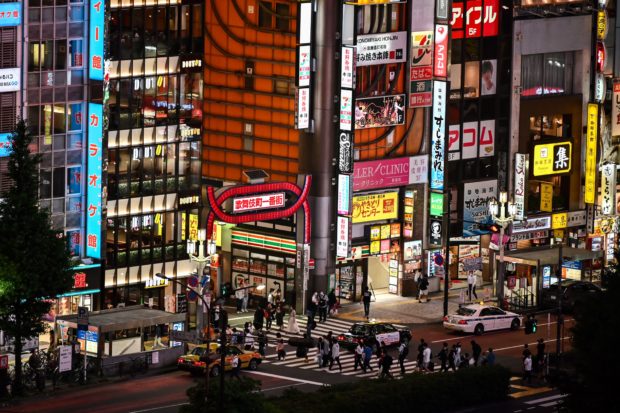Japan adamant spike in COVID-19 cases not a second wave

This file photo taken on June 24, 2020 shows the entertainment district of Kabukicho in Tokyo. – Tokyo unveiled plans on July 9, 2020 to offer nightclubs subsidies to close as new coronavirus infections in the capital hit a single-day record, with many linked to entertainment districts. (Photo by CHARLY TRIBALLEAU / AFP)
TOKYO — Six weeks after Tokyo lifted a state of emergency and with its economy battered into recession, the Japanese capital is setting unwelcome new records of daily Covid-19 cases.
The 224 new infections last Thursday broke a high of 206 cases that was recorded on April 17, a mere 10 days after the state of emergency was imposed.
This was quickly broken the next day, when 243 new cases were recorded, with a further 206 yesterday.
Elsewhere, the south-western prefecture of Kagoshima had just 11 cases as of June 30 – a figure that had soared to 137 by yesterday.
Okinawa recorded over 50 cases yesterday, chiefly due to clusters at the United States Marine Corps Air Station Futenma. Osaka had 31 cases last Thursday, the first time the city had seen figures over 30 since April 29.
Nationwide, Japan recorded over 400 cases on Friday, the first time this has happened since April 24.
Still, no new emergency decree is forthcoming. Japan’s leaders are hesitant to adopt measures that will further hurt the economy so soon after businesses and social activities were given the green light to restart.
They are also adamant that the rise in cases is not the much-dreaded “second wave” but something anticipated with the return to a semblance of normal life.
Instead of putting cities back under stay-home requests and business closure advisories, Japan is bucking the norm: It further eased restrictions on Friday by raising the maximum accepted capacity at events from 1,000 to 5,000 people, or up to 50 per cent of a venue’s total capacity.
And spectators are now allowed into stadiums to watch pro-baseball and football league matches.
Japan will also launch a domestic tourism campaign on July 22, in time for the summer holidays, and said that advisories against travel outside prefecture borders are unnecessary.
Japan’s point man for its Covid-19 strategy, Economy Minister Yasutoshi Nishimura, said: “The medical system is not under pressure and the testing system is properly in place. But we must thoroughly analyze how the infection spreads and be vigilant against clusters in elderly facilities or hospitals.”
While Tokyo has recorded 1,496 cases so far this month, Governor Yuriko Koike said this was largely due to increased testing, especially in the high-risk nightlife districts. This has picked up more mild or asymptomatic cases.
But cases are also on the rise in the neighboring prefectures that together make up the Greater Tokyo region – Saitama, Chiba and Kanagawa – which are recording daily figures unseen in months. Millions commute to Tokyo from these areas for work and school.
Cases linked to Tokyo have also cropped up far afield in Aomori, Fukushima, Tottori, Okinawa and Ibaraki, where a health official blatantly said travel to Tokyo was “high risk”.
Meanwhile, many of the new cases in Kagoshima were traced to the New Odama Lee Danshaku pub, while Tokyo’s cases were traced to nightlife establishments, including host and hostess clubs in Shinjuku’s Kabukicho red-light district and Ikebukuro, as well as maid cafes in Akihabara.
Aggressive contact tracing has also picked up small pockets of clusters, including seven cases – four children and three teachers – at a kindergarten in Tokyo’s Musashino district.
Officials have said that a new state of emergency was unnecessary because 70 per cent to 80 per cent of the recent cases are in their 20s and 30s – age groups that are less prone to developing severe symptoms that will overwhelm medical institutions.
In Tokyo, despite the surge in new infections, only six people are seriously ill and the city has seen no Covid-19 deaths for two weeks.
This is unlike the situation the city faced in April, when many of the cases were senior citizens and medical institutions were on the brink of collapse.
But the rising figures may lead to a clash between the national government and prefectural leaders on what would be the best way going forward.
Tokyo Governor Koike has urged residents to avoid unessential travel to other prefectures – a call that the national government said is not necessary.
Saitama Governor Motohiro Ono said that the spike in cases in Tokyo was “extremely concerning” and urged the national government to consider imposing more safety measures.
For more news about the novel coronavirus click here.
What you need to know about Coronavirus.
For more information on COVID-19, call the DOH Hotline: (02) 86517800 local 1149/1150.
The Inquirer Foundation supports our healthcare frontliners and is still accepting cash donations to be deposited at Banco de Oro (BDO) current account #007960018860 or donate through PayMaya using this link.